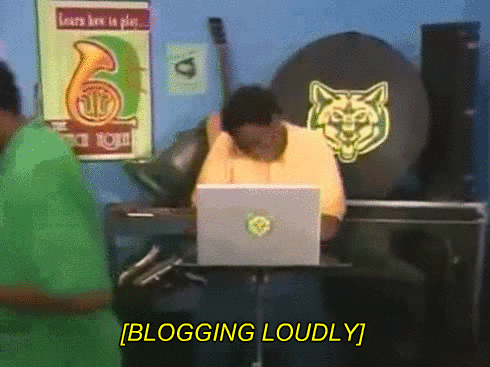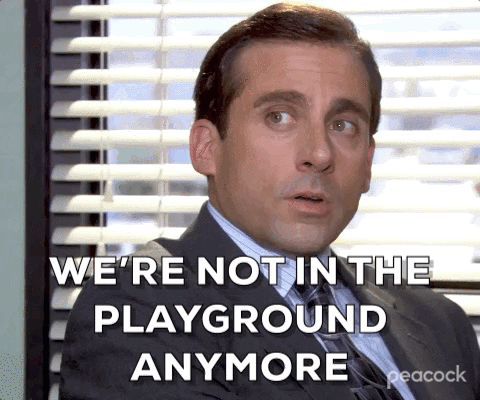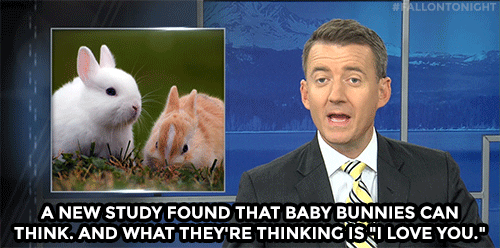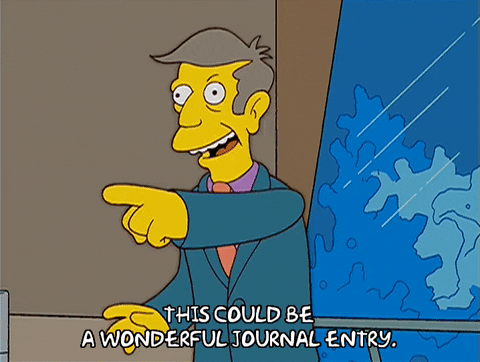When I Grow Up
There’s a common saying that to be a writer all you have to do is write. The real difference between a good writer and a bad writer is practice.
Welcome to my practice.
I started this newsletter to build a portfolio. Though generally awful, quarantine gave me time to work on my writing. In turn, my writing gave me something to focus on besides the pandemic.
This is my 33rd edition, and I'm finally feeling ready to grow. I made an instagram page for My Side Piece last weekend, and, while that might not seem like a major step, I’ve been stressed about it all week.
Turns out that sharing a blog is scary.
In a newsletter the audience is anonymous. I’ve used this list to test the waters, and you've all graciously signed on as guinea pigs. I wasn’t ready for my writing to stumbled upon by someone who didn’t know me personally.
That and I’m still not willing to call myself a ‘blogger.’
Giphy
In grade 3 my teacher told me I could be a writer. She took my short story about a tree and read it over the PA system during morning announcements. From that year on I always said I wanted to be an author.
That’s it. That one teacher is the entire basis I had in pursuing this hobby.
Never underestimate the power of compliment.
As an adult praise holds less weight. It’s a different reality being a 26-year-old blogger than it is as an 8-year-old writer. For one, at 8 I would have been happy to show the world what I had written. In fact I have distinct memories of sharing books of poetry I wrote with my mom’s friends.
Now an instagram page about my work makes me anxious.
In taking this hobby public I’m saying I think it’s good enough for the outside world. Honestly I don’t know if that’s true.
The plague of writing is feeling compelled to do it, but not thinking it’s anything special. Surely if I can think of these words, anyone can. It's not like I'm churning out plays in iambic pentameter. If anything I’m subsidizing my therapy costs by working through whatever is on my mind.
How do I simultaneously convince the world and myself that my content is worth reading?
The answer is probably 'fake it ’til you make it.' Before I try that though, I'm going to let you in on what I'm really feeling.
And, first and foremost, I want to thank you for being a dedicated reader. If you're on instagram, please give me a follow.
My insecurities and I thank you in advance.
Giphy
It’s a cliche to ask when we stop believing in childhood dreams. I'm going to do it anyway though:
At what point do we stop taking ourselves seriously when it comes to planning our futures? As children we’re constantly asked to share what we want to be “when we grow up," and most of us have strong answers.
I wanted to be a dancer/artist/writer. Clearly focusing has never been my strong suit....
From an early age we pick our professional dreams. And, unfortunately, a lot of them aren't viable. As much as I'd love to spend my days churning out gif-filled articles, I have bills to pay.
Unfortunately that reality hits home sooner than we'd like. By high school I was panic choosing my courses to not eliminate any high-paying career options. In this article a mother laments that, by age 7, her daughter "already realizes that motherhood may be at odds with a career in chemistry."
For fucks sake.
Only a select few follow their preschool passions, and yet almost all of us have felt that twinge of guilt for leaving behind our youthful aspirations. If not guilt, then failure. Not everyone is cut out to be a doctor, fireman, or astronaut. Maybe being an author was never in my future.
That's not to say childhood you would be upset with where you ended up. Part of the issue is that kids only know so many professions exist. No toddler is aspiring to be a bank manager or digital sales strategist. Instead we bucket ourselves into the same few professions we can name.
To that end a 2017 study lists YouTube and movies as the strongest influence on children’s career pursuits. Superheroes, teachers, singers...our brains are wired to imagine what we have already seen. That's why visibility is so important. As proof, that same study highlighted a 4-year-old boy with huge aspirations to be the “Ice Cream Man at Costco.” A noble pursuit of a child who just wants to add more joy into the world.
Ultimately choosing a career lot of pressure to put on kids. Adults always joke that they “still don’t know what they want to be when they grow up”, so why are we continually asking children?
I found a blog urging parents to shift away from this question. Instead of asking kids what job they want to have, ask what problems they want to solve. I personally love this framing, and I wish more people asked that question in general.
I spend a great deal of time thinking about my next career move. The short answer is that I don’t know where I'll end up. It's not as cut and dry as it was when I was little. I love to write. I have a slew of transferable skills, and I have an arts degree that simultaneously makes me eligible to do everything and nothing....
Careers are defined by circumstance. They're influenced be who you know, when you know them, and pure chance. I never saw myself working in sports. I also never saw myself becoming a blogger.
At every turn though, there have been problems I wanted to solve.
That same blog suggested a few other questions that I’d love to highlight. For kids, or for any of you trying to figure out your next step forward, these might be a better place to start than choosing a dream job:
What do you love to do?
What makes you happy?
When do you feel like you are successful?
How do you like to work/play with others?
What comes easily to you?
What do you want to learn more about?
What is important to you?
Maybe if we asked more questions like these we'd take some of the pressure off kids (and me). Let's help guide each other to the answer instead of forcing a response. Because, truly, no kid should have a career plan in preschool.
Giphy
Down the Rabbit Hole
Today a lot of my answers are around creating. I love writing this newsletter for you each week, and it gives me an excuse to dive into different topics - a lot of which are personal.
Right now I'm reading Watership Down.
Spoiler alert for anyone not up-to-date on their middle school reading list....
Midway through their journey, the rabbits find a new burrow beside a farm. At first it seems like the perfect home. The farmer leaves discarded vegetables outside, no predators lurk around, and the underground community has ample space. It's an eerily easy life for wild rabbits.
Of course the luxuries come with a price.
For all the food the farmer provides, he also sets snares. He keeps the burrow healthy, happy, and hefty enough to have for dinner every once and awhile. As his guests, the native rabbits accept these wires without questioning. They rationalize that the occasional deaths are a small price to pay for relative comfort.
It's the rodent equivalent of the golden handcuffs in large companies. Yeah the job is boring, but it has benefits. And a pension!
To cope with their tainted lifestyle, the rabbits adopt strange behaviour. They don't have to worry about predators and instead channel that energy into art, religion, and song. They try to create a sense of purpose since their normal activities (foraging, digging, hiding) are useless.
It's tough not to draw the parallel between that burrow and quarantine. While stuck inside I've channelled my extra energy into this writing. I often think it’s more of an outlet for me than it’s ever been a value add for you. This newsletter keeps my mind off of the usual pastimes I've lost in the pandemic.
In a deeper way, my personal snares stem from a fear of vulnerability. Over the last 6 months I've written about burnout, depression, chronic pain, sexual harassment, and shame. I trust this audience to read with empathy.
Instagram is a whole other sea of predators.
To step outside the burrow of your inboxes is to risk my comfort. The challenge is remembering why. Golden handcuffs are golden for a reason, but freedom sounds even nicer. Presuming, of course, that you can get beyond the wires.
Giphy
“Post Up, Flawless”
The personal element of my writing aside, the biggest thing that scares in sharing this newsletter is the loss of control.
When I'm stressed I often go to the dollar store to look at notebooks. It's not like I ever need new ones. In fact, I have dozens of blank notebooks waiting for me at all times.
Despite hoarding stationary, I’ve never been good at keeping journals. Mostly because I get embarrassed re-reading them. If I see an error or flaw, I'll rip out the pages and start over. Every notebook has to have a specific purpose and, if I think that purpose isn't serving me anymore, it goes right into the recycling.
Right now I have 6 different notebooks on the go, and I like to keep extras just in case I think of a new reason to use them.
Similarly, nothing is more frightening to me than bullet journaling. All those beautiful templates online - if mine looked anything less than perfect I’d hate myself.
That’s not an exaggeration.
I’m a perfectionist and competitive to the point of self destruction. I can’t keep calorie counters on my phone less I game-ify unnecessary weight loss. I can’t use workout or meditation apps that log streaks because losing is non-negotiable. I panic when I don’t measure up to whatever insane rubric I’ve created.
This newsletter is an exercise in eliminating control. I regulate the time I spend on it, and at the end of the week something pops into your inbox. Sometimes it’s awesome, other times it’s not. The point is that it shows up on Sundays.
Remember, to be a writer all you have to do is write.
In some ways that's a horrifying thought. That means finishing projects and sharing work. Sitting with a “great line” or “amazing idea” is worthless unless you test it from start to finish. Having a million empty notebooks is a waste.
Putting My Side Piece into the world is a way for me to accept imperfection. I'm trying to understand that the whole is greater than the sum of its parts. The discipline of consistency is more important than the thrill of a good week.
If empty notebooks are useless, so are blogs without readers. This newsletter is cathartic and great practice, but without goals it becomes purposeless. Without feedback, I’ll never improve.
I cherish the group of you that open my email every week. Thank you for being along for the ride, and thank you for helping me grow.
Now it's time to own my blogger status. It always worked for Carrie, so how bad can it be?




